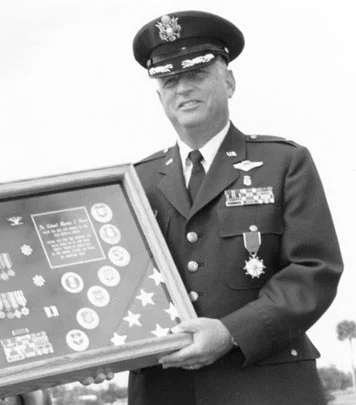ABOUT THE AUTHOR OF DOCTOR IN BLUE
Martin I. (Marty) Victor (1936-2020) received his undergraduate degree from M.I.T. in 1958, his M.D. from Duke University in 1962, and became Board Certified in Aerospace Medicine and, later, in Family Practice. He wrote numerous articles for military and civilian publications, and was a steadfast advocate for improving patient care.
Marty chose the Air Force over the Army to fulfill a college ROTC requirement because he liked their blue uniforms. He had no thought of a military career then. Entering college, he had looked forward to continuing his lifelong fascination with outer space by becoming a physicist. In 1956, witnessing the suffering of victims of New England's polio epidemic so profoundly affected him that he changed to pre-med that year.
After graduating from medical school and completing an internship, Dr. Victor found himself facing a six month delay before he could start a residency at Duke. Impatient to forge ahead, and eager to have some source of income, it was then - in 1963 - that he joined the Air Force, planning to stay in for less than three years and return to Duke afterwards. Before that initial commitment ended, Marty had decided to forego the Duke residency in favor of becoming a resident in Aerospace Medicine through the Air Force - a three-year program which included earning a Master's Degree in Public Health (described in the chapter "Baltimore") as well as other military and scientific training. From these somewhat random beginnings, by the mid-1960's, a dedicated physician and Air Force officer had begun to emerge. By 1969, Marty was a hospital commander well on the way to developing his own distinctive professional style. By the time of his 1993 retirement from the Air Force, Marty was a full Colonel with many awards and accolades to his credit, but his first priority and highest goal was still to provide the very best possible experience of medical care to all whom he served.
Dr. Victor remained active and involved in making the world a better place right up until his sudden passing in the fall of 2020. His wife SaraJane continues to speak and write about his life and times. Contact her or the publisher at DoctorInBlue@gmail.com
A 2015 CONVERSATION With Martin I. Victor (Marty),
Author of Doctor in BluE
Why did you write Doctor in Blue?
While on active duty, I had enjoyed writing many published articles for newspapers and other publications. After retiring, I became aware that I had a story – really many stories – to tell. I was privileged to be part of an organization with numerous very talented individuals who gave their all, but were often not credited or recognized outside their immediate circle. Doctor in Blue is almost as much their story as it is mine.
What do you think are the biggest misconceptions people have about military physicians?
That doctors join the military because they are somehow afraid of going into private practice (not true at all in my experience); that the pay in the military for doctors is substandard (generally taken as a whole package, including retirement benefits, it is not less than in the modern civilian world); and that the facilities are substandard.
If you had not joined the Air Force in January of 1963, what path do you think your career would have taken?
I would have tried to renegotiate my considerable loans, started an ophthalmology residency at Duke in the summer of 1963, and probably become an ophthalmologist in North Carolina.
Do you have any regrets about your Air Force career?
None whatsoever!
What do you miss most about the Air Force?
The camaraderie, the uniform, flying in military planes, and, of course, being the commander of a unit.
Was there anything you didn't like about being a hospital commander?
At times, not having all the resources to provide all the services that I wished to offer the folks who depended on us.
What military habits or routines are so ingrained they continue to be part of your life even now?
Saluting the flag, maintaining a military posture, and trying to stay fit by exercising regularly.
And finally, what’s your secret for being able to power through challenges and disappointments? How do you remain an “eternal optimist” despite whatever life throws at you?
I became an eternal optimist when, in my second year of medical school at Duke, I knew I could be a good physician. More than fifty-five years later, I’m still someone who sees the world as full of opportunities to make it a better place.
